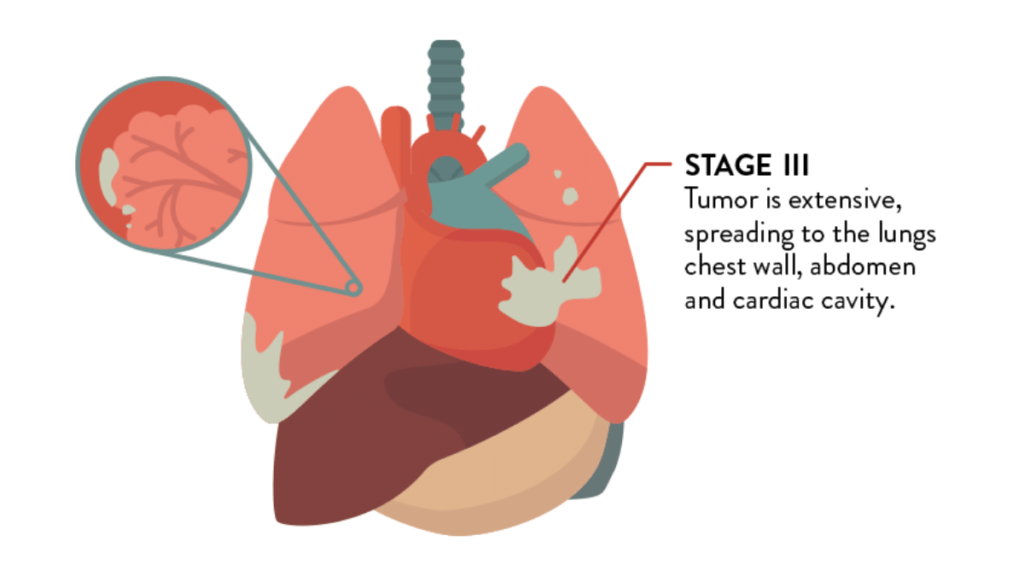What is Stage 3 Mesothelioma?
Stage 3 mesothelioma is a type of cancer that has progressed beyond the point of localized tumors but has not yet spread to distant organs or lymph nodes. At this stage, cancer has spread beyond its original site of origin and may have affected nearby tissues, structures, or organs. Stage 3 mesothelioma is divided into two subcategories, 3A, and 3B, based on the extent and location of the tumor.
Stage 3A: The tumor has spread to the chest wall, the diaphragm muscle, or the lining of the lungs on both sides of the body. Cancer may have also spread to the lymph nodes on the same side of the chest as the primary tumor.
Stage 3B: Cancer has spread to lymph nodes on both sides of the chest and nearby organs such as the esophagus or heart. The tumor may invade the spine, ribs, or other nearby structures at this stage.

Symptoms of Stage 3 Mesothelioma
The symptoms of stage 3 mesothelioma may vary depending on the location and extent of cancer. However, common symptoms at this stage may include the following:
- Chest pain or discomfort
- Shortness of breath
- Persistent cough
- Fatigue or weakness
- Unintentional weight loss
- Difficulty swallowing
- Swelling in the face or arms
- Hoarseness or voice changes
- Night sweats
- Fever or chills
At this stage, cancer may have also spread to other organs, which may cause additional symptoms such as abdominal pain, nausea, vomiting, or jaundice.
It is important to note that mesothelioma symptoms may take years to develop and can be easily mistaken for other less severe conditions. Therefore, if you have been exposed to asbestos or have a family history of mesothelioma, it is essential to discuss any persistent or concerning symptoms with your doctor, even if they seem minor. Early diagnosis and treatment may improve the outcome for individuals with stage 3 mesothelioma.
Diagnosing Stage 3 Mesothelioma
The diagnosis of stage 3 mesothelioma typically involves several tests and procedures to confirm the presence and extent of cancer. The following are some of the standard diagnostic tests and procedures:
- Imaging tests: Imaging tests can help diagnose mesothelioma and determine the extent of the cancer. These imaging tests allow doctors to see if there are any tumors present and where they might be located. Types of imaging tests for mesothelioma include X-rays, CT scans, and MRI scans.
- Biopsy: A biopsy is a medical procedure involving taking a small tissue sample from an affected area to be examined under a microscope. The results can confirm the presence of cancer cells and help the doctor determine the most effective treatment.
- Blood tests: Blood tests are one diagnostic tool doctors may use to check for mesothelioma. These tests look for particular markers in the blood that could signify the presence of this cancer.
- Pulmonary function tests measure lung function and can help determine if mesothelioma is causing breathing difficulties.
- Thoracoscopy or laparoscopy: These procedures involve the insertion of a thin, lighted tube with a camera attached to it through small incisions in the chest or abdomen to visualize and biopsy the affected area.
Diagnosing stage 3 mesothelioma can be challenging, and it often requires a multidisciplinary team of medical professionals, including oncologists, radiologists, pathologists, and pulmonologists, to diagnose accurately. Early diagnosis is crucial for the best treatment options and outcomes for individuals with mesothelioma.
Treatments for Stage 3 Mesothelioma
The treatment options for stage 3 mesothelioma depend on several factors, including the type and location of cancer, the extent of its spread, and the patient’s overall health. The following are some of the common treatments for stage 3 mesothelioma:
- Surgery: Surgery may be an option for some individuals with stage 3 mesothelioma, depending on the location and size of the tumor. Surgery aims to remove as much cancer as possible, and it may be combined with other treatments, such as chemotherapy and radiation therapy.
- Chemotherapy: Chemotherapy is the use of certain drugs to treat cancer. The drugs used in chemotherapy work by targeting and destroying cancer cells while leaving healthy cells unscathed. This can be done independently, but it is often combined with surgery or radiation therapy to increase the chances of success.
- Radiation therapy is a type of treatment that uses high-energy particles or rays to get rid of cancer cells. It can be given independently or as part of a combination of treatments. When radiation therapy is administered, it damages the DNA inside cancer cells and causes them to die, helping to reduce the size of tumors and stop the spread of cancer.
- Immunotherapy: Immunotherapy is a type of cancer treatment that harnesses the power of the body’s immune system to fight disease. It activates proteins and cells in the immune system to target and destroy cancer cells while leaving healthy cells intact. Immunotherapy can be used as a standalone treatment or combined with chemotherapy or radiation therapy to achieve better results.
- Palliative care focuses on relieving symptoms and improving the quality of life for individuals with advanced cancer. It may involve pain management, emotional support, and other therapies to help manage the side effects of cancer and its treatment.
The treatment of stage 3 mesothelioma can be complex. It often requires a multidisciplinary team of medical professionals to develop a personalized treatment plan tailored to the individual’s needs and circumstances. It is essential to discuss all available treatment options with your healthcare provider to make informed decisions about your care.
The prognosis for Stage 3 Mesothelioma
The prognosis for stage 3 mesothelioma is generally poor. Still, it may vary depending on various factors, such as the location of cancer, the extent of its spread, the patient’s age, overall health, and response to treatment.
Some studies show that the median survival time for individuals with stage 3 mesothelioma ranges from 12 to 16 months. However, some individuals may survive longer, while others may have a shorter life expectancy. The overall 5-year survival rate for stage 3 mesothelioma is generally less than 10%.
Individuals with stage 3 mesothelioma often have a more advanced disease that may be more challenging to treat. However, aggressive treatment options such as surgery, chemotherapy, and radiation therapy may help improve survival and quality of life.
Discussing your prognosis with your healthcare provider is essential, as they can provide more specific information based on your circumstances. Additionally, seeking emotional support and counseling may help individuals and their families cope with the challenges of a mesothelioma diagnosis.
Life Expectancy for Stage 3 Mesothelioma Patients
The life expectancy for individuals with stage 3 mesothelioma is generally poor. Still, it may vary depending on the patient’s age, overall health, treatment response, and cancer’s location and extent.
Some studies show that the median survival time for individuals with stage 3 mesothelioma ranges from 12 to 16 months. However, some individuals may survive longer, while others may have a shorter life expectancy.
Factors that may impact life expectancy for individuals with stage 3 mesothelioma include:
- Age: Older individuals may have a shorter life expectancy than younger individuals.
- Overall health: Individuals with other medical conditions or a weakened immune system may have a shorter life expectancy.
- Response to treatment: Individuals who respond well to treatment and have a good treatment response may have a longer life expectancy.
- Type of mesothelioma: The location and type of mesothelioma may impact life expectancy. For instance, individuals with pleural mesothelioma (affecting the lining of the lungs) generally have a shorter life expectancy than those with peritoneal mesothelioma (affecting the lining of the abdomen).
Life expectancy estimates are not always accurate and may vary based on individual circumstances. Discussing your life expectancy with your healthcare provider is essential, as they can provide more specific information based on your situation. Additionally, seeking emotional support and counseling may help individuals and their families cope with the challenges of a mesothelioma diagnosis.
Support and Resources for People With Stage 3 Mesothelioma
Receiving a diagnosis of stage 3 mesothelioma can be overwhelming and challenging for the individual and their family. However, various support and resources are available to help manage the physical and emotional aspects of the disease. The following are some of the common support and resources for people with stage 3 mesothelioma:
- Mesothelioma Support Groups: Joining a support group can help individuals connect with others who are going through similar experiences. Support groups offer emotional support, information, and resources to help cope with the disease.
- Mesothelioma Advocacy Groups: Mesothelioma advocacy groups provide information, resources, and support to individuals and families affected by mesothelioma. They also work to raise awareness about the disease and advocate for research and policy changes to support mesothelioma patients.
- Palliative Care: Palliative care focuses on relieving symptoms and improving the quality of life for individuals with advanced cancer. It may involve pain management, emotional support, and other therapies to help manage the side effects of cancer and its treatment.
- Counseling: Counseling or therapy can help individuals and their families cope with a mesothelioma diagnosis’s emotional and psychological challenges. Counseling can offer support, guidance, and coping strategies to help manage the stress and anxiety often accompanying a cancer diagnosis.
- Financial Assistance: Mesothelioma treatment can be expensive, and many individuals may face financial challenges. Some organizations offer financial assistance to help with treatment, travel, and other related expenses.
- Legal Assistance: Mesothelioma is often caused by exposure to asbestos, and individuals may be entitled to compensation. Some organizations offer legal assistance to help individuals and their families pursue legal action against companies responsible for their asbestos exposure.
Discussing these support and resources with your healthcare provider, who can provide information and referrals to appropriate organizations and professionals, is essential.
Conclusion
In conclusion, a diagnosis of stage 3 mesothelioma can be overwhelming, and it is crucial to seek support and resources to help manage the physical and emotional challenges of the disease.
Support groups, advocacy groups, palliative care options, counseling services, financial assistance, and legal assistance are available to mesothelioma patients and their families. These resources can offer emotional support, information, and guidance to help cope with the disease and improve the quality of life.
Discussing these options with your healthcare provider, who can provide information and referrals to appropriate organizations and professionals, is essential.




